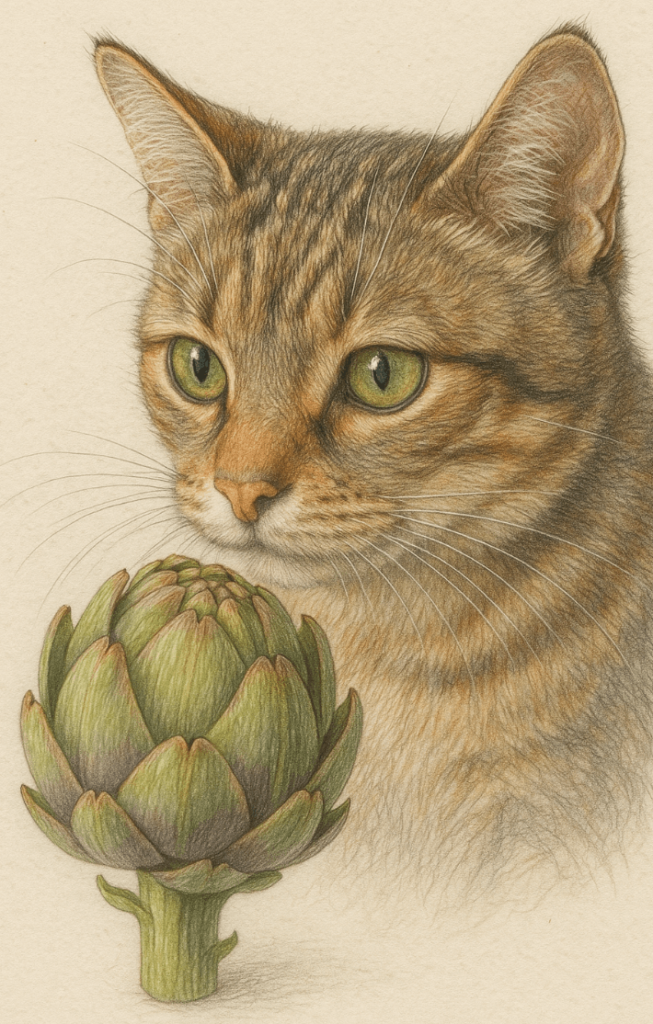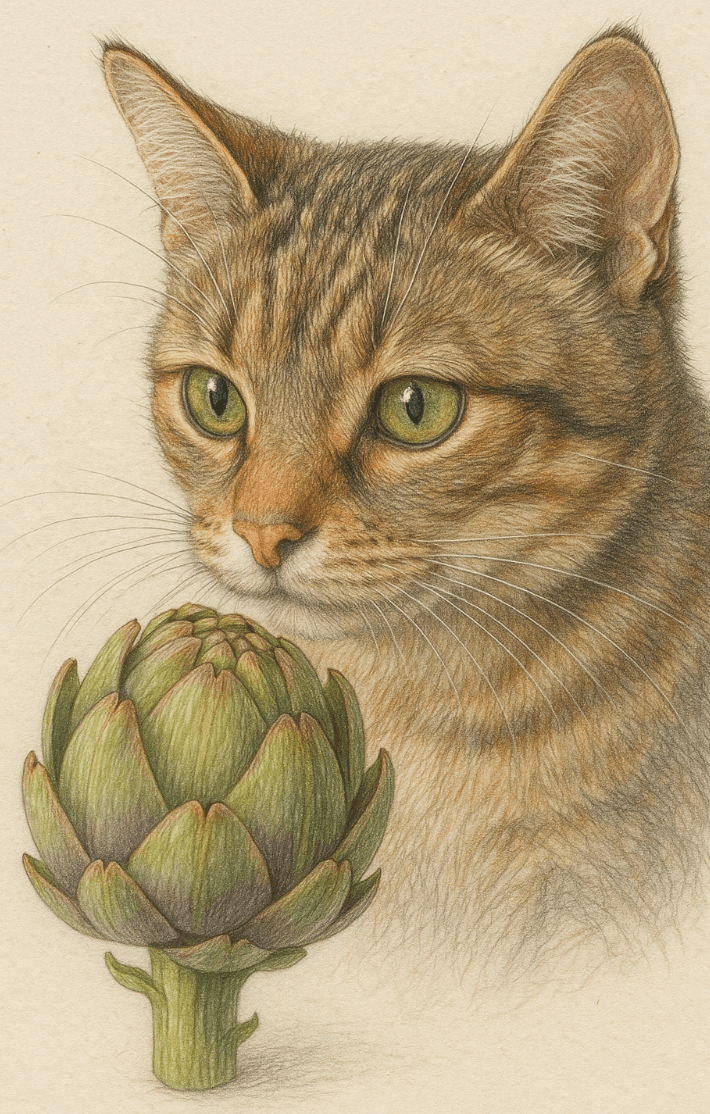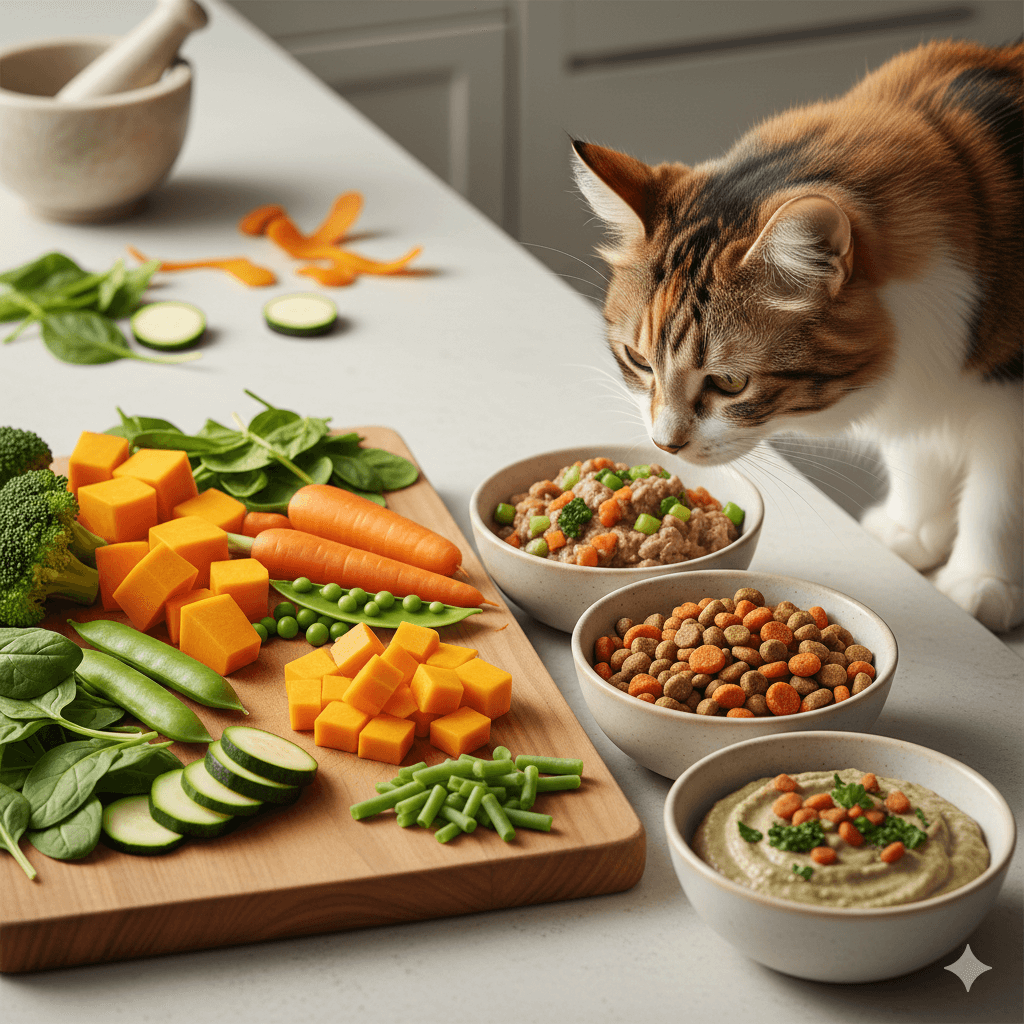Can Cats Eat Artichokes?
As cat owners, we often find ourselves wondering whether certain human foods are safe for our feline companions. Artichokes, with their unique texture and earthy flavor, might catch your attention as a potential snack for your curious kitty. But can cats eat artichokes? While these vegetables are packed with nutrients that benefit humans, the answer isn’t as straightforward when it comes to cats. Felines have specific dietary needs, and not all “people foods” are suitable for them. In this blog post, we’ll explore whether artichokes are safe for cats, the potential risks and benefits, and how to introduce new foods into your pet’s diet responsibly.
Potential Risks of Feeding Artichokes to Cats
While artichokes aren’t toxic to cats, they do come with certain risks that every pet owner should be aware of before offering them as a treat. Here are some key concerns to consider.
Digestive Upset:
Cats’ digestive systems are not designed to process fibrous vegetables like artichokes, which can lead to vomiting or diarrhea.Choking Hazard:
The tough, leafy parts of artichokes can pose a choking risk if not properly prepared or if swallowed whole.Allergic Reactions:
Some cats may have sensitivities or allergies to artichokes, resulting in symptoms like itching, swelling, or respiratory issues.High Fiber Content:
Excessive fiber can disrupt a cat’s delicate digestive balance, leading to discomfort or constipation.Added Seasonings or Preparations:
Many artichoke dishes include salt, butter, garlic, or other seasonings that are harmful to cats. Always serve plain, unseasoned artichokes.
These risks highlight the importance of moderation and careful preparation when introducing artichokes to your cat’s diet.
Possible Benefits of Artichokes for Cats (When Fed Safely)
Despite the risks, artichokes do contain some nutrients that could potentially benefit cats when fed in small, controlled amounts. Here’s what makes them a somewhat appealing option.
Rich in Antioxidants:
Artichokes are packed with antioxidants, which may help reduce inflammation and support overall health.Low in Calories:
As a low-calorie food, artichokes can be a guilt-free treat for cats watching their weight.Hydration Support:
Artichokes have a high water content, which can contribute to your cat’s daily hydration needs.Trace Nutrients:
They contain small amounts of vitamins like C and K, as well as minerals like magnesium and potassium, which are beneficial in moderation.Novel Texture and Flavor:
Offering artichokes occasionally can provide mental stimulation and variety in your cat’s diet.
While these benefits exist, they must be weighed against the potential downsides to ensure your cat’s safety.
Check this guide 👉Can Cats Eat Gravy? Best 7 Expert Tips!
Check this guide 👉Can Cats Eat Venison? Best 7 Expert Tips!
Check this guide 👉Can Cats Eat Baby Food? Best 7 Expert Tips!

Safe Ways to Serve Artichokes to Cats | Risks of Improper Preparation |
|---|---|
Plain, cooked artichoke hearts (no seasoning) | Seasoned or buttered artichokes |
Small, bite-sized pieces | Whole leaves or large chunks that can choke |
Steamed or boiled (without added ingredients) | Raw artichokes, which are harder to digest |
Occasional treats, not regular meals | Overfeeding, leading to digestive upset |
Monitor for allergic reactions | Ignoring signs of discomfort or illness |
How to Safely Introduce Artichokes to Your Cat
If you decide to offer artichokes to your cat, it’s essential to follow these guidelines to minimize risks and ensure a positive experience.
Start with a Tiny Amount:
Offer just a small piece to see how your cat reacts before giving more.Choose Cooked Over Raw:
Cooked artichokes are softer and easier for cats to digest compared to raw ones.Avoid Seasonings and Additives:
Never add salt, spices, garlic, or oil, as these can harm your cat’s health.Remove Tough Leaves and Choke Hazards:
Only serve the soft inner heart, avoiding the tough outer leaves and sharp edges.Observe for Adverse Reactions:
Watch for signs of digestive upset, allergies, or discomfort after feeding.
By following these steps, you can safely determine if artichokes are a suitable occasional treat for your cat.
Signs Your Cat May Not Tolerate Artichokes
Even with precautions, some cats simply don’t tolerate artichokes well. Recognizing these warning signs will help you act quickly if something goes wrong.
Vomiting or Diarrhea:
These are common signs of digestive distress caused by unfamiliar or hard-to-digest foods.Loss of Appetite:
If your cat refuses to eat after trying artichokes, it could indicate an adverse reaction.Excessive Drooling:
Drooling is a sign of nausea or irritation, which may occur if the artichoke was difficult to swallow.Lethargy or Weakness:
Sudden changes in energy levels could signal a more serious issue requiring veterinary attention.Itching or Swelling:
Allergic reactions may manifest as skin irritation, facial swelling, or difficulty breathing.
Recognizing these symptoms early allows you to seek veterinary care promptly and prevent further complications.
Common Mistakes to Avoid When Feeding Artichokes to Cats
Feeding artichokes to your cat requires thoughtfulness to avoid mistakes that could endanger their health. Here are some pitfalls to watch out for.
Offering Raw Artichokes:
Raw artichokes are tough and fibrous, making them difficult for cats to digest. Always cook them first.Ignoring Portion Sizes:
Giving too much artichoke can overwhelm your cat’s digestive system. Stick to tiny portions.Adding Harmful Ingredients:
Salt, butter, garlic, or spices can harm your cat’s health. Serve artichokes plain and unseasoned.Leaving Tough Parts Intact:
The outer leaves and choke can pose choking hazards. Remove these parts entirely.Expecting Immediate Acceptance:
Cats are naturally cautious eaters, and many may reject artichokes outright. Don’t force them to eat it.
Avoiding these mistakes ensures a safer and healthier experience for your cat.
Alternatives That Are Safer Than Artichokes
If you’re hesitant about feeding artichokes, there are plenty of cat-safe alternatives that provide similar nutritional benefits without the associated risks.
Cooked Pumpkin:
Rich in fiber and hydration, cooked pumpkin is excellent for digestive health and widely accepted by cats.Plain Green Beans:
Low in calories and high in fiber, green beans are a safe and nutritious treat for cats.Steamed Carrots:
Softened carrots offer vitamins A and K, supporting eye health and immunity when served in moderation.Zucchini:
This mild vegetable is easy to digest and provides hydration and trace nutrients.Blueberries:
Packed with antioxidants, blueberries make a tasty and healthy occasional treat for cats.
These alternatives allow you to cater to your cat’s curiosity while keeping them safe.
Understanding Your Cat’s Natural Diet and Preferences
Cats are obligate carnivores, meaning their bodies are designed to thrive on a diet primarily composed of animal protein. Understanding their natural preferences helps explain why vegetables like artichokes should be approached with caution.
Meat-Based Nutrition Needs:
Cats require taurine, an amino acid found in meat, which is essential for heart and eye health. Vegetables cannot replace this need.Limited Ability to Process Plant Matter:
Unlike omnivores, cats lack the enzymes needed to efficiently break down plant fibers, making many vegetables indigestible.Curiosity vs. Necessity:
Cats may show interest in human foods, but this doesn’t mean those foods are nutritionally appropriate for them.Preference for Strong Scents:
Cats rely heavily on smell to determine food appeal, and bland vegetables like artichokes may not entice them.Individual Tastes Vary:
Just like humans, cats have unique preferences—some may enjoy nibbling on vegetables, while others will turn up their noses.
By recognizing these traits, you can better align your cat’s diet with their biological needs while exploring safe options for variety.
Frequently Asked Questions About Cats and Artichokes
Are artichokes toxic to cats?
No, artichokes are not toxic, but they can cause digestive issues if not prepared or served correctly.
Can kittens eat artichokes?
Kittens have sensitive digestive systems, so it’s best to avoid giving them artichokes altogether.
What part of the artichoke is safest for cats?
The soft inner heart is the safest part; avoid the tough outer leaves and choke.
How often can I give my cat artichokes?
Artichokes should only be given occasionally as a treat, not as a regular part of their diet.
What should I do if my cat eats too much artichoke?
Monitor for symptoms of digestive upset and contact your vet if you notice any concerning signs.
Prioritizing Your Cat’s Health When It Comes to Artichokes
Feeding artichokes to your cat can be a fun experiment, but it’s crucial to prioritize their health and well-being above curiosity. While artichokes aren’t inherently toxic, they come with risks that require careful consideration. By understanding the potential dangers, preparing the vegetable safely, and monitoring your cat’s reaction, you can ensure a positive experience. Remember, cats are obligate carnivores, meaning their primary nutritional needs are met through meat—not vegetables. Always consult your veterinarian before introducing new foods to your cat’s diet, and focus on providing a balanced, species-appropriate meal plan.
Can a Cat Be Tested for Rabies? Best 7 Expert Tips! – Learn if testing is possible, understand the process, and discover prevention tips to keep your cat safe from rabies.
Can a Dog Be Tested for Rabies? Best 7 Expert Tips! – Learn how rabies testing works, why it’s critical, and what every dog owner needs to know.
Best Vegetables for Cat Food: Best 7 Expert Tips! – Discover safe, nutritious veggies to boost your cat’s diet, support digestion, and enhance overall health naturally.
Best Vegetables for Dog Food: Best 7 Expert Tips! – Discover safe, nutritious veggies to boost your dog’s diet, support digestion, and enhance overall health naturally.





